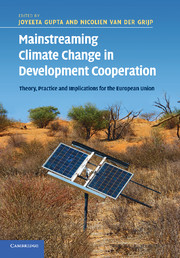 Mainstreaming Climate Change in Development Cooperation
Mainstreaming Climate Change in Development Cooperation Book contents
- Frontmatter
- Contents
- List of contributors
- Foreword
- Acknowledgements
- List of abbreviations
- Part I Introduction
- Part II Theoretical Exploration
- Part III Governance
- 4 Global governance: development cooperation
- 5 Global governance: climate cooperation
- 6 Incorporating climate change into EU development cooperation policy
- 7 Incorporating climate change into EU Member States' development cooperation
- Part IV Case Studies
- Part V Conclusions
- Index
- References
7 - Incorporating climate change into EU Member States' development cooperation
Published online by Cambridge University Press: 07 May 2010
- Frontmatter
- Contents
- List of contributors
- Foreword
- Acknowledgements
- List of abbreviations
- Part I Introduction
- Part II Theoretical Exploration
- Part III Governance
- 4 Global governance: development cooperation
- 5 Global governance: climate cooperation
- 6 Incorporating climate change into EU development cooperation policy
- 7 Incorporating climate change into EU Member States' development cooperation
- Part IV Case Studies
- Part V Conclusions
- Index
- References
Summary
Introduction
Given that 80% of development cooperation resources are managed at European Union (EU) Member State level, this chapter moves from an analysis of the policy processes at EU level to the processes within individual countries. It examines the extent to which climate change adaptation and mitigation are incorporated into development cooperation policies and practices in selected EU Member States, with a view to identifying relevant best practices.
The EU's 27 Member States are not all equally active in aid provision (see Chapter 10), and not all Member States are members of the OECD DAC (see Chapter 4). Furthermore, environmental awareness in the Member States differs, implying differing degrees of commitment to environmental issues in general and in aid strategies. This chapter examines the aid policies and practices in Denmark, France, Germany, the Netherlands and the UK, thereby including some of the largest EU donors in absolute and relative terms (the UK and Germany), countries that are considered leaders (Denmark and the Netherlands) and laggards (France, Germany) in terms of aid quality (e.g. Concord, 2009) and countries that spend a large proportion of their aid on environmental and climate-change-related activities (Teixeira Santos and de Lopez, 2007: 9). This choice implies a bias in favour of countries that provide green aid, but provides good early experiences on how climate change is being incorporated into aid policies (cf. OECD, 2009b).
- Type
- Chapter
- Information
- Mainstreaming Climate Change in Development CooperationTheory, Practice and Implications for the European Union, pp. 206 - 252Publisher: Cambridge University PressPrint publication year: 2010


